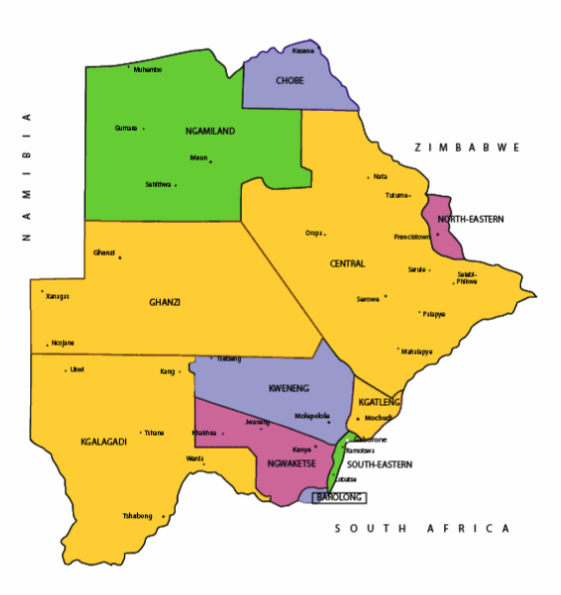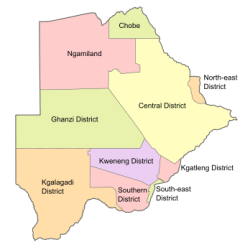Places and their polling stations in Mmathethe-Molapowabojang, Botswana
399 Maokane
1857 Maokane Primary School
1858 Maokane Kgotla
1859 Mosadimogolo Blukom Tree
1860 Mogale JSS
1861 Ukwi Borehole
400 Lorolwane
1862 Lorolwane Primary School
1863 Lorolwane Kgotla
1864 Jn-16
401 Gasita
1865 Gasita Primary School
1866 Gasita Kgotla
1867 Dintsana Mobile Stop
1868 Gasekitla Mobile Clinic (Tent)
402 Metlobo-Magoriapitse
1869 Magoriapitse Primary School
1870 Mosi Primary School
1871 Mosi Namola Leuba Dam
1872 Kanngwe Primary School
1873 Mmalore Crop Production
1874 Magoriapitse Tribal Offices
1875 Tswaaneng Kgotla
1876 Metlobo Primary School
1877 Metlobo Kgotla
1878 Tswaaneng Primary School
403 Segwagwa
1879 Segwagwa Primary School
1880 Ramonnedi Borehole
1881 Mogapinyana VDC House
1882 Ditojane Private School
1883 Diphatana VDC House
1884 Mogonono Dam
1885 Dipina Mobile Stop
1886 Gasegwagwa Kgotla
404 Mmathethe
1887 Mmathethe Primary School
1888 Roads Camp
1889 Ramolefe Primary School
1890 Mmathethe JSS
1891 Tebogo Kgotla
1892 Mmathethe Clinic
1893 Mokalawagaboleka
405 Gathwane-Mogojogojwe
1894 Mogojogojwe Primary School
1895 Majaalela Primary School
1896 Gatuma Mobile Stop
1897 Gatampa Private School
1898 Motsentshe Primary School
1899 Lorwana Primary School
1900 Lejwana Primary School
1901 Gathwane Primary School
1902 Mmadikalo Kgotla
406 Molapowabojang West
1903 Molapowabojang Primary School
1904 Gamoswaane Mobile Clinic
1905 Tshweneyagae Kgotla
1906 Maisane Kopore School
1907 Mosamowakwena Primary School
1908 Phate Football Ground
1909 Diabo Primary School
1910 Dipotsana Primary School
1911 Mokala Tent (Near Warona’s Ploughing Field)
407 Molapowabojang East
1912 Chichi JSS
1913 Maruswa Cattle Crush
1914 Motlhwatse Clinic
1915 Pitsonyane Primary School
1916 Subithi Day Care Centre
408 Digawana
1917 Digawana Primary School
1918 Nthwalang JSS
1919 Gopong Kgotla
1920 Gopong Primary School
Reference: iec.gov.bw/index.php/electoral-districts/polling-stations.html
Botswana
Botswana is a country in Africa. It is topographically flat, with approximately 70 percent of its territory being the Kalahari Desert.
It is bordered by South Africa to the south and southeast, Namibia to the west and north, and Zimbabwe to the northeast.
Capital: Gaborone
Currency: Botswanan Pula
Official language: English
Population: 2.588 million (2021) World Bank
Dialing code: +267
Gross Domestic Product: 17.61 billion USD (2021) World Bank
Botswana’s ten districts are:
- Southern District
- South-East District
- Kweneng District
- Kgatleng District
- Central District
- North-East District
- Ngamiland District
- Kgalagadi District
- Chobe District
- Ghanzi District
Botswana’s councils created from urban or town councils are: Gaborone City, Francistown, Lobatse Town, Selebi-Phikwe Town, Jwaneng Town, Orapa Town and Sowa Township.






The name Botswana refers to ‘Land of the Tswana’. The landlocked, Southern Africa country is officially known as the Republic of Botswana.














Botswana is connected to Zambia through the Kazungula Bridge making it the world’s shortest border between two countries.
A country of slightly over 2 million people (2021), Botswana is one of the most sparsely populated countries in the world. It is essentially the nation state of the Tswana ethnic group, who make up 79% of the population.

About 11.6 per cent of the population lives in the capital and largest city, Gaborone.
Formerly one of the world’s poorest countries—with a GDP per capita of about US$70 per year in the late 1960s—it has since transformed itself into an upper-middle-income country, with one of the world’s fastest-growing economies.


The Tswana ethnic group were descended mainly from Bantu-speaking tribes who migrated southward of Africa to modern Botswana, living in tribal enclaves as farmers and herders.




In 1885, the British colonised the area and declared a protectorate under the name of Bechuanaland.
As colonisation stopped, Bechuanaland became an independent republic under its current name on 30 September 1966.


Since then, it has been a representative republic, with a consistent record of uninterrupted democratic elections and the lowest perceived corruption ranking in Africa since at least 1998.

The economy is dominated by mining and tourism. Botswana has a GDP (purchasing power parity) per capita of about $18,113 as of 2021, one of the highest in subsaharan Africa.


Botswana is the world’s biggest diamond producing country.
Its relatively high gross national income per capita gives the country a high standard of living and the third-highest Human Development Index of continental Sub-Saharan Africa (after Gabon and South Africa).
The country has been adversely affected by the HIV/AIDS epidemic. In 2002, Botswana began offering anti-retroviral drugs (ARVs) to help combat the epidemic.
Botswana is a member of the Southern African Customs Union, the Southern African Development Community, the Commonwealth of Nations, and the United Nations.

